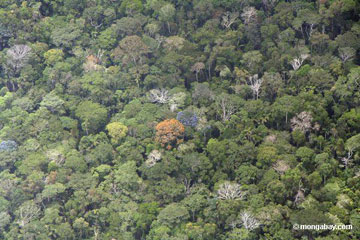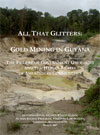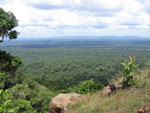Guyana’s forests offered as massive carbon offset
Guyana’s forests offered as massive carbon offset
mongabay.com
November 26, 2007
Guyana has offered up the entirety of its remaining forest cover as a giant carbon offset, reports The Independent.
Guyana’s President, Bharrat Jagdeo, has offered to place the country’s extensive rainforests under the control of an international body in exchange for “development aid” and “technical assistance needed to make the change to a green economy.”
“We can deploy the forest against global warming and, through the UK’s help, it wouldn’t have to stymie development in Guyana,” President Jagdeo told The Independent. “We are a country with the political will and a large tract of standing forest. I’m not a mercenary, this is not blackmail and I realize there’s no such thing as a free lunch. I’m not just doing this just because I’m a good man and want to save the world, I need the assistance.”

|
Guyana, which is located in northeastern South America and is more than 75 percent forested, is seeking to capitalize in an emerging market for carbon offsets for forest conservation. Presently there is no legal mechanism for capturing the value of carbon stored in existing forests, but countries with high forest cover and low deforestation rates–like Guyana–are hoping that U.N. climate talks in Bali next month will establish a framework for compensated forest protection. A study published in August calculated conservatively that Guyana could earn $57 million per year in carbon credits from such efforts. Other estimates, based on the concept of “avoided deforestation”, are even higher.
President Jagdeo says that Guyana already has a model for the proposal: in 1989 the country deeded 1 million acres of forest to the Commonwealth of Nations as a “sustainable-use” reserve called Iwokrama. Scientists estimate that Iwokrama locks up around 120 million tons of carbon, an amount roughly equivalent to the annual emissions of the United Kingdom.
While President Jagdeo is hopeful that Guyana can be rewarded for conserving its forests, he says that the country is poor and will do what it is necessary to improve living conditions for its people. Climbing prices for gold and timber, coupled with surging demand for biofuels derived from sugar cane are increasingly attractive options relative to forest preservation. A proposed Brazilian would build a paved highway that would connect X to Georgetown, transforming Guyana’s capital into a major port for commodities from the Amazon region.
“Maybe we should just cut down the trees. Then someone would recognize the problem,” said President Jagdeo. “But I want to think we can fulfil our people’s aspirations without cutting down the trees.”
Globally, deforestation and land use change accounts for 15-20 percent of total emissions, a larger source of greenhouse gases than the entire transportation sector.
CITATION: Daniel Howden. “Take over our rainforest” in the The Independent, 24 November 2007
Related articles
Rainforest tribe establishes massive sustainable-use reserve
(10/4/2007) An indigenous group in Guyana has established one of the world’s largest sustainable forest reserves, reports Conservation International.
Low deforestation countries to see least benefit from carbon trading
(8/13/2007) Countries that have done the best job protecting their tropical forests stand to gain the least from proposed incentives to combat global warming through carbon offsets, warns a new study published in Tuesday in the journal Public Library of Science Biology (PLoS). The authors say that “high forest cover with low rates of deforestation” (HFLD) nations “could become the most vulnerable targets for deforestation if the Kyoto Protocol and upcoming negotiations on carbon trading fail to include intact standing forest.”
 |
Gold mining in Guyana damages environment, threatens Amerindians
(3/6/2007) Informal gold mining is causing environmental harm and human rights abuses in Guyana says a new report from the International Human Rights Clinic (IHRC) of Harvard Law School’s Human Rights Program. Wildcat gold mining has been a serious problem in the Guiana shield countries of Brazil, Venezuela, Guyana, Suriname and French Guiana. Rising gold prices in recent years have only worsened the problem, as illegal miners have flooded the region clearing forest, polluting rivers, and making threats against indigenous people.
 |
Biofuels, logging may spur deforestation in Guyana
(2/15/2007) Growing timber exports and rising interest in biofuels are raising concerns that deforestation could accelerate in the South American country of Guyana. Guyana is a small, lightly populated country on the north coast of South America. About three-quarters of Guyana is forested, roughly 60 percent of which is classified as primary forest. Guyana’s forests are highly diverse: the country has some 1,263 known species of amphibians, birds, mammals, and reptiles, and 6,409 species of plants.